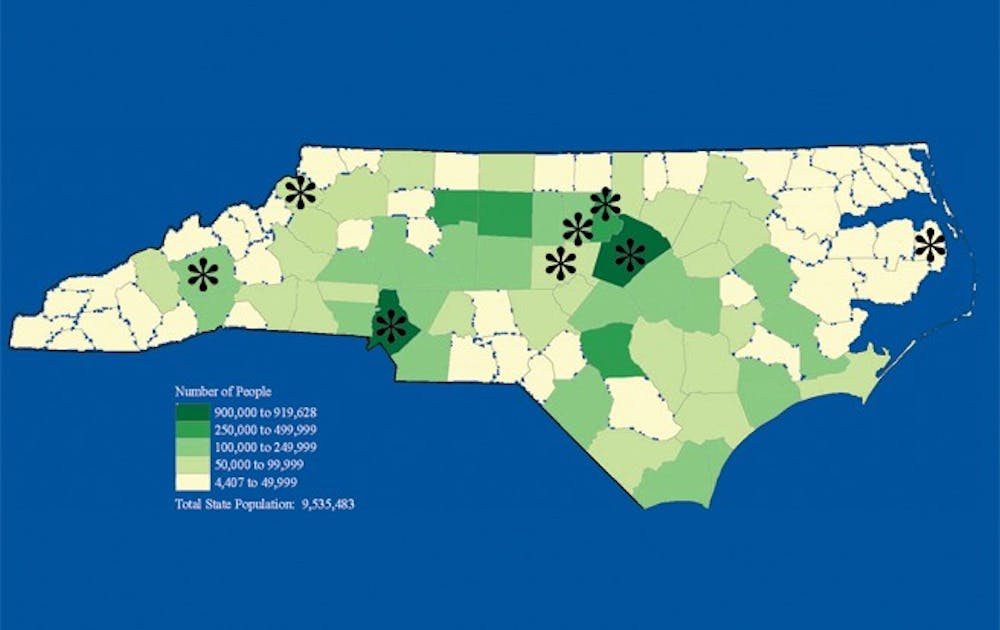Support for a ban on same-sex marriage in North Carolina may stem from a more conservative, older voter base.
North Carolina voters passed Amendment One, a constitutional amendment that will ban same-sex marriage and all domestic unions in the state, 61 to 39 percent in the May 8 primary election. The voting split largely between young and old demographics and urban and rural populations. Despite the low voter turnout of state primaries, political science professor Michael Munger, said he believes the amendment would have passed even if there had been 100 percent voter participation.
“The people who voted in this election were those who cared,” Munger said. “And the people who cared enough to vote were on the support side.”
Generational and religious factors most likely contributed to the passage, said Kathryn Bradley, professor of the practice at the School of Law.
Placing the amendment on the primary ballot rather than in the general elections also helped it pass by such a large margin, Munger said. The few contested races on the ballot—both presidential primaries and the GOP gubernatorial race were already settled—coupled with low voter turnout, suggest that those voters who participated were focused on the amendment.
Munger added that placing the amendment on the general election ballot would have been more beneficial to the Republican Party, as it would have drawn conservative voters to participate.
“It was more honest and fair to schedule it in the primaries,” he said. “In terms of political tactics... to benefit Republican candidates, you would’ve had it in the general elections.”
State primaries typically attract low voter turnouts, but the May 8 primary had the second highest voter participation in North Carolina history with 34.66 percent participation, said Susan Myrick, election policy analyst for the Civitas Institute, a conservative political advocacy group. The highest voter turnout for an NC primary election occurred in the highly contested presidential race of 2008, where there was 36.86 percent voter participation. These numbers compare to the 14.4 percent voter turnout in 2010 and the 16 percent in 2004.
Despite communities such as Durham, Charlotte, Raleigh and Chapel Hill where the population is predominately young people and there are many higher education institutions, North Carolina remains part of the South and the Bible Belt with a large religiously conservative constituent who believes that same-sex marriage contradicts The Bible, Bradley said.
She added that support for the amendment and same-sex marriage was largely divided along generational lines—the older generation was generally less receptive to same-sex marriage and therefore in favor of the amendment.
“With young people, it’s not an issue at all,” Bradley said. “But for people who have grown up in a different time and under a different set of beliefs about how the world operates, it takes some doing to change views.”
Of those who voted early, those between 60 and 70 years of age comprised 28.3 percent of participants, according to data from Civitas. Twenty to thirty-year-olds cast 8.8 percent of early votes.
Data for the complete primary results have not yet been released, Myrick said.
Geographically, the more densely populated, urban districts opposed the amendment and rural ones tended to support it, said Janie Long, director of the Center for Lesbian, Gay, Bisexual and Transgender Life. Research shows that personal familiarity with LGBT people has a powerful effect on promoting acceptance of LGBT issues, but more rural areas have less visible LGBT communities, she added.
“It’s not that they’re not there, but they’re not out. There’s not a critical mass—it’s too scary,” Long said. “That’s why you can see in these large cities you have more opportunity to be exposed to diversity in general.”
Thirty-one other states, including most recently California, Florida and Arizona, have already amended their state constitutions to ban same-sex marriage. Although many of these states still retain the right to domestic unions—a first step toward same-sex marriage—Amendment One prohibits any form of non-traditional, heterosexual marriage in North Carolina.
“People who are very opposed to same-sex marriage were afraid that if that step was possible, we would be heading down a slippery slope and the next thing you know, we’d be having same-sex marriage in North Carolina,” Bradley said. “They wanted to do everything possible to prevent that.”
Get The Chronicle straight to your inbox
Signup for our weekly newsletter. Cancel at any time.

